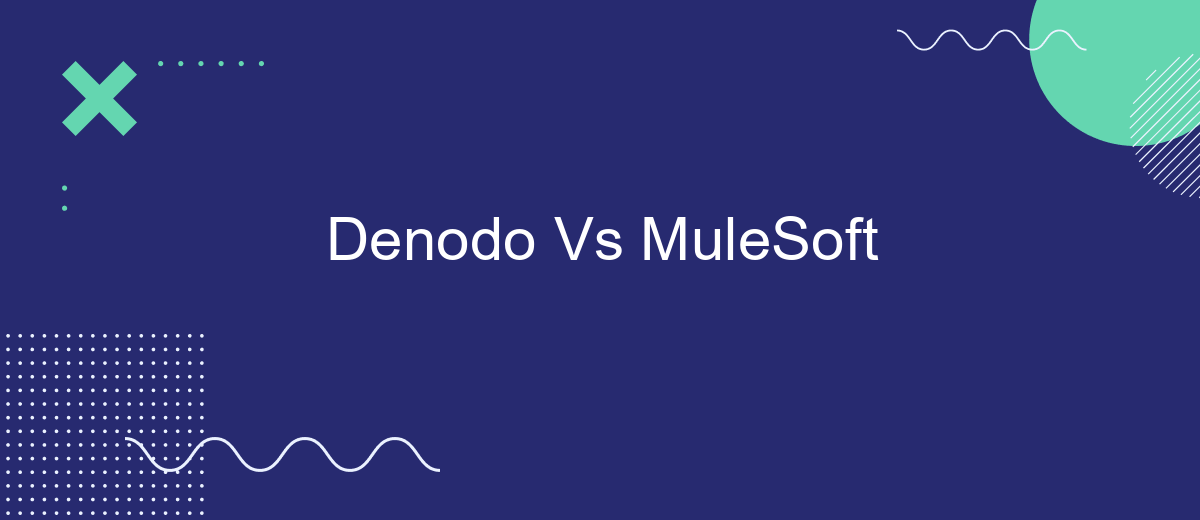In the rapidly evolving landscape of data integration and management, choosing the right platform is crucial for business success. This article delves into a detailed comparison between Denodo and MuleSoft, two leading solutions in the field. We will explore their key features, strengths, and weaknesses to help you make an informed decision tailored to your organization's needs.
Introduction
In the evolving landscape of data integration and API management, selecting the right tool is crucial for businesses aiming to streamline their operations. Denodo and MuleSoft are two prominent platforms that offer robust solutions for these needs. Understanding their differences and unique capabilities can help organizations make informed decisions.
- Denodo: Specializes in data virtualization, allowing seamless access to diverse data sources without the need for physical data movement.
- MuleSoft: Focuses on API-led connectivity, enabling businesses to integrate various applications, data, and devices through APIs.
Both Denodo and MuleSoft offer distinct advantages, depending on the specific requirements of an organization. For example, SaveMyLeads is a service that simplifies integration processes by automating data transfers between various platforms, which can complement either Denodo's or MuleSoft's capabilities. By leveraging these tools, businesses can enhance their data management and integration strategies, ultimately driving efficiency and innovation.
Comparison of Features

When comparing Denodo and MuleSoft, it's essential to consider their core features. Denodo excels in data virtualization, enabling users to access, manage, and query data across multiple sources without the need for physical data movement. This capability is particularly beneficial for organizations looking to create a unified data view for analytics and reporting. Denodo also offers robust data governance, security, and performance optimization features, making it a strong choice for enterprises with complex data landscapes.
On the other hand, MuleSoft specializes in API-led connectivity, which facilitates seamless integration between various applications, data, and devices. Its Anypoint Platform provides a comprehensive suite of tools for designing, building, and managing APIs, making it easier for businesses to create interconnected systems. For companies looking to streamline their integration processes, services like SaveMyLeads can complement MuleSoft by automating the transfer of leads and data between different platforms, further enhancing operational efficiency. While both Denodo and MuleSoft offer powerful capabilities, the choice between them depends on whether the primary need is data virtualization or API-based integration.
Use Cases

Denodo and MuleSoft serve distinct yet complementary roles in the realm of data integration and management. Denodo specializes in data virtualization, allowing organizations to access and manage their data in real-time without the need for physical data movement. MuleSoft, on the other hand, excels in API-led connectivity, enabling seamless integration of various applications, data, and devices through APIs.
- Real-time data integration: Denodo provides real-time access to disparate data sources, making it ideal for scenarios where up-to-date information is crucial.
- API management: MuleSoft's API-led approach allows for efficient management and orchestration of APIs, facilitating smooth communication between different systems.
- Data governance: Denodo offers robust data governance capabilities, ensuring data quality and compliance across the organization.
- Application integration: MuleSoft excels in integrating various enterprise applications, streamlining workflows and improving operational efficiency.
- Automated workflows: Tools like SaveMyLeads can further enhance these integrations by automating data workflows between different platforms, reducing manual intervention.
Both Denodo and MuleSoft provide powerful solutions for data integration and management, catering to different needs within an organization. By leveraging their unique strengths, businesses can achieve a more cohesive and efficient data ecosystem.
Pricing and Licensing

When comparing Denodo and MuleSoft, pricing and licensing are crucial factors to consider. Both platforms offer robust data integration solutions, but their cost structures and licensing models differ significantly, impacting the overall value proposition for businesses.
Denodo typically follows a subscription-based pricing model, which is often tailored to the specific needs and scale of the organization. This allows for flexibility but can also mean that costs vary widely depending on usage and deployment configurations.
- Denodo: Subscription-based, flexible pricing
- MuleSoft: Subscription-based, tiered pricing
- SaveMyLeads: Fixed monthly fee, easy integration setup
MuleSoft, on the other hand, offers a more structured tiered pricing model, which may include different levels of access and features based on the chosen plan. This can make budgeting more predictable but might limit flexibility. For businesses looking for a straightforward and cost-effective solution to set up integrations, SaveMyLeads offers a fixed monthly fee model, providing an easy and affordable way to manage integrations without complex pricing schemes.
Conclusion
In conclusion, both Denodo and MuleSoft offer robust solutions for data integration and management, each with its unique strengths and capabilities. Denodo excels in data virtualization, providing a unified view of data across disparate sources without the need for physical data movement. On the other hand, MuleSoft stands out with its extensive API-led connectivity, enabling seamless integration of applications, data, and devices through its Anypoint Platform.
When choosing between Denodo and MuleSoft, organizations should consider their specific integration needs and existing infrastructure. For those seeking to streamline the integration process even further, services like SaveMyLeads can be invaluable. SaveMyLeads automates the integration of various applications and services, reducing manual effort and ensuring data consistency across platforms. Ultimately, the choice between Denodo and MuleSoft will depend on the organization's unique requirements, but leveraging additional tools like SaveMyLeads can enhance the overall integration strategy.
- Automate the work with leads from the Facebook advertising account
- Empower with integrations and instant transfer of leads
- Don't spend money on developers or integrators
- Save time by automating routine tasks
FAQ
What are the primary differences between Denodo and MuleSoft?
Can Denodo and MuleSoft be used together?
Which platform is better for real-time data integration?
How do these platforms handle security?
Are there services available to help implement and automate integrations for these platforms?
You probably know that the speed of leads processing directly affects the conversion and customer loyalty. Do you want to receive real-time information about new orders from Facebook and Instagram in order to respond to them as quickly as possible? Use the SaveMyLeads online connector. Link your Facebook advertising account to the messenger so that employees receive notifications about new leads. Create an integration with the SMS service so that a welcome message is sent to each new customer. Adding leads to a CRM system, contacts to mailing lists, tasks to project management programs – all this and much more can be automated using SaveMyLeads. Set up integrations, get rid of routine operations and focus on the really important tasks.

